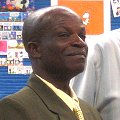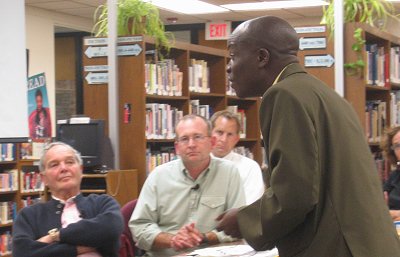- By Dan Veaner
- Around Town
 Print
Print  In our final installment of our interview with Mbaka Oromo Principal William Kabbis, we talked about his impressions of America and Lansing in particular, about the Internet, and his interaction with lansing school children during his visit here. Kabbis spent two weeks in Lansing visiting our schools and meeting people here who have contributed to the reconstruction of his school in Kenya. (Click here for Part 1 of this interview. Click here for Part 2).
In our final installment of our interview with Mbaka Oromo Principal William Kabbis, we talked about his impressions of America and Lansing in particular, about the Internet, and his interaction with lansing school children during his visit here. Kabbis spent two weeks in Lansing visiting our schools and meeting people here who have contributed to the reconstruction of his school in Kenya. (Click here for Part 1 of this interview. Click here for Part 2).LS: I saw your schedule and you are doing a lot. Are you they taking you sightseeing?
WK: They are taking me to people I am talking to. They are also taking me to see beautiful scenery.
I am learning a lot. By talking to you I am learning a lot. By seeing those things I am learning a lot. I am learning from the questions you are asking me. I am not just answering them. Every day, by the end of the day I am a different person than I was when I woke up.
LS: Have they taken you to stores?
WK: Last week (Lansing elementary school music teacher) Mrs. Menges took me to Wegmans. A very big and amazing mall -- I've never seen (something like it) in my life. Never have I imagined it exists!
LS: It's so big you would think it's a mall, but it's just one store!
WK: Ah! It's too big!
LS: It's unbelievable to me, too.
WK: Recently Mrs. Maureen Stanhope took me to another mall. It has shops inside it. It has foodstuffs. It has clothing. It has shoes. It also has book shops.
LS: Before you came I was thinking that you probably don't have stores like that in Kenya.
WK: What you call malls we call supermarkets. They are normally small. They are not as big as what I am seeing here. When I was taken to the one you call Pyramid it shocked me. And Mrs. Stanhope told be that by American standards it's not big. So I was wondering what big is big?!
LS: My wife comes from Minneapolis and the biggest one is there -- I think it is the biggest one in the world. There is another big one in Syracuse not too far from here. It is several stories high. I have to admit that personally I don't like these huge stores.

William Kabbiss addresses school board members (Left to right)
Richard Thayler, Glenn Swanson, Glenn Cobb
WK: Being here has been a very interesting thing, and for my school and for my school community. As I leave this place everybody will want to hear from me. My family is waiting to hear from me. My students and teachers at school are waiting to hear from me. Members of my education board are also excited to hear from me. So are the parents. I will share this visit with them.
LS: Have you taken pictures?
WK: I have taken many pictures almost everywhere. They will also facilitate my narrations (when I get home).
LS: Do you have the Internet at home?
WK: Yes, we have Internet.
LS: Has the Internet been brought into the school?
WK: No, it's not there. It is basically in towns. The school is in the rural part of the country.
LS: Do you think that Internet is coming soon?
WK: No, not really soon. It is expensive to have it.
LS: The reason I ask you this question is that I have two kids in Lansing High School. Last night they were doing something during the day, so they came home kind of late. They said, 'I have to do homework and I need the computer.' They're looking things up on Google search and typing on the computer.
When I went to school we didn't have computers like this -- they weren't invented. If I wanted to do what they do I had to go to the library. I don't know if they are learning better. But they have better access.
WK: Yes, better access. Your school is advantaged to have (what it has). I told your students that they are very lucky to be in America and to be in their school. Because those facilities are not even owned by universities in Kenya. A few universities have them, and there are too few. They must be shared amongst students.
I was telling your elementary students that even high school students in Kenya have not seen what a computer looks like. When Chris Barrett came to our school he brought a laptop computers. Not even the teachers had seen one and seen what a laptop computer looks like. The teachers were excited to see it and how it operated magically.
LS: (Laughs) Well it is kind of magic.
WK: (Laughs) It's an experience that we don't have. Even at the (Lansing) elementary school I was told, 'These are our computers.' I went to the middle school and was told, 'This is our computer room.' I was being shown libraries that have got more books than meet the eye. For us if you have a library it will be difficult because our libraries don't have books. You get a few books for reference -- not for taking away.
In Kenya we lack reading materials. People are not exposed to reading. Newspapers are one of the few things that can be easily accessed, but newspapers are very expensive. If they have news you feel like you should read it. But the 40 shillings you would use to buy a newspaper, you would rather buy food for your children, so people don't even see newspapers as important.
There is a certain class of people, the so-called 'haves' that have access to these things... or government institutions. We have people who use government funds to buy them. That's the system.
So I told your students they are lucky to have those materials and they should make good use of them to be better people. I showed them our situation in the classrooms -- they were amazed. Some even went as far as asking me questions.
They asked whether people who learn in such conditions can pass exams. I told them, 'Yes. Some students get 100%. Some get over 90% on their tests. This is a testimony that if you give them the environment you have here they would always get 100% in everything. Because to me you have everything and you have no reason to fail to get 100% in your schools.'
Your children are lucky.
LS: What is your favorite part of being the Head Teacher, and what is your favorite part of this trip?
WK: My favorite part of being the Head Teacher is accessing my leadership in assistance of the less fortunate.
My favorite part of this trip is the education part of it. What I've seen in the Lansing schools has amazed me. The kind of facilities I have seen there, having been in many institutions in Kenya. Even the so-called private, prestigious institutions there don't have what I've seen. So to me it's a big lesson.
----
v4i43



